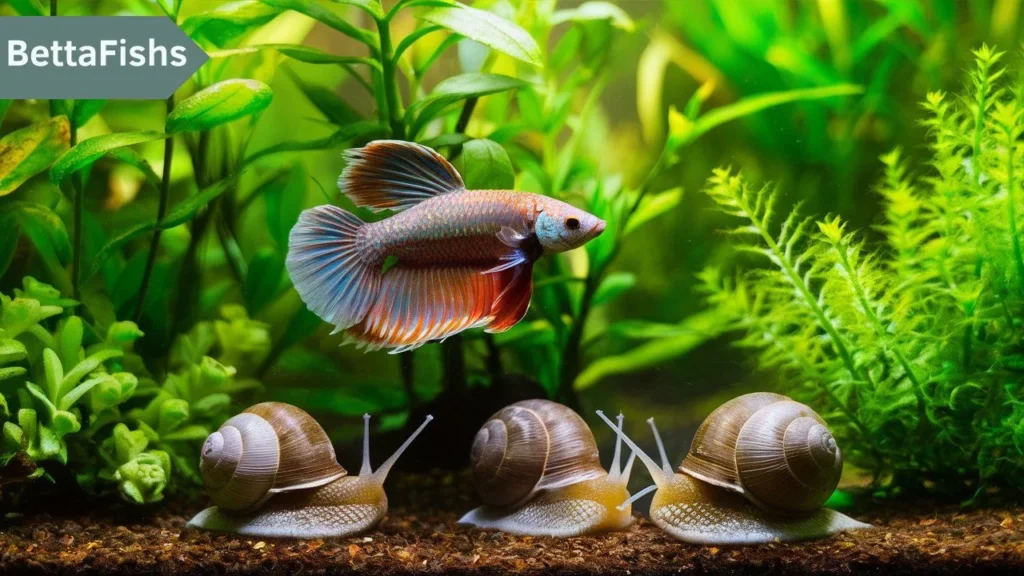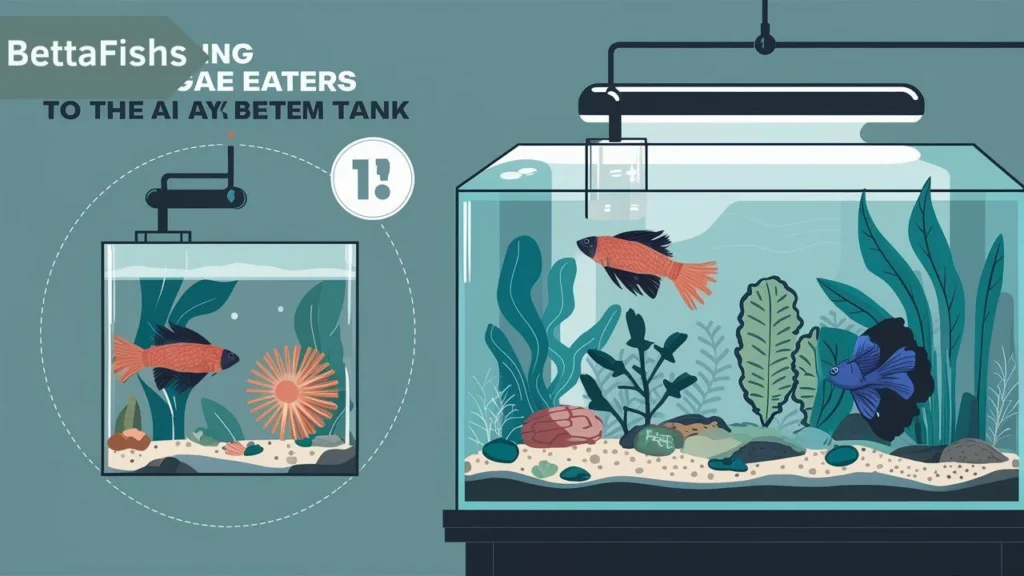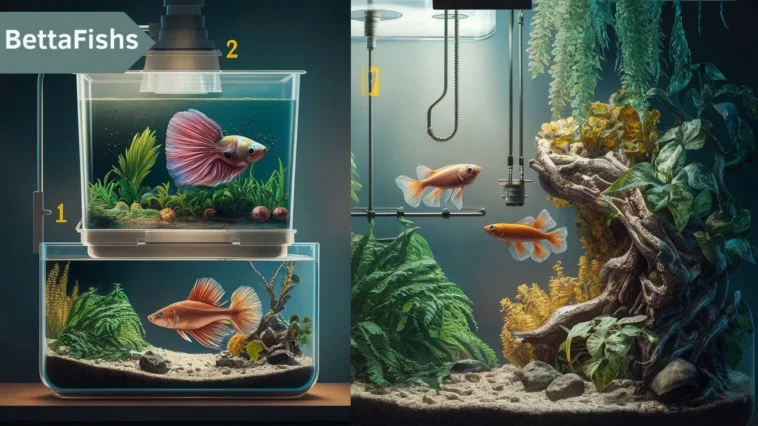Aquarium enthusiasts love betta fish because of their colorful patterns and graceful fins. However, when it comes to tank mates, Betta fish can be quite territorial. So, “Can Betta fish live with algae eaters?” This article will explore this question in depth, providing insights into the compatibility, tank setup, and best practices for keeping Betta fish with algae eaters.
Siamese fighting fish, sometimes called betta fish, are prized for their vibrant colors and gregarious dispositions. However, their aggressive nature often raises concerns when considering tank mates. Algae eaters, on the other hand, are essential in maintaining a clean aquarium environment by consuming algae that can otherwise overtake a tank. But can these two very different types of fish coexist peacefully?
Betta Fish Temperament
Territorial Nature of Betta Fish
Betta fish are notorious for their territorial instincts, particularly among males. They are known to defend their space aggressively, especially in small tanks. This behavior can be problematic when introducing new tank mates, as Betta fish may see them as threats.
Aggression Towards Tank Mates
The level of aggression displayed by Betta fish can vary. Some Bettas may tolerate tank mates, while others may become overly aggressive. Understanding your Betta’s temperament is crucial before introducing any algae eaters into the tank.
Ideal Tank Conditions for Betta Fish
Betta fish thrive in warm, clean water with a temperature range of 76-82°F (24-28°C). They also prefer a tank with plenty of hiding spots and gentle water flow. These conditions must be maintained when introducing any algae eaters to ensure the well-being of both species.
Types of Algae Eaters
Common Algae Eaters in Aquariums
Algae eaters come in various species, each with unique characteristics. A few of the most prevalent kinds are:
- Snails: Such as Nerite snails, which are excellent algae eaters.
- Shrimp: Amano shrimp are known for their algae-eating capabilities.
- Plecos: Specifically, Bristlenose Plecos are popular in larger tanks.
Behavioral Characteristics of Algae Eaters
Algae eaters are generally peaceful and spend most of their time scavenging the tank for algae. However, their behavior can vary depending on the species, and not all algae eaters are suitable for a Betta tank.
Algae Eaters Suitable for a Betta Tank
When choosing algae eaters for a Betta tank, it’s essential to consider species that are small, non-aggressive, and able to thrive in the same water conditions as Betta fish. Suitable algae eaters include:
- Nerite Snails: These are excellent for small tanks and are unlikely to provoke aggression from Betta fish.
- Amano Shrimp: While slightly more active, Amano shrimp can coexist with Betta fish if introduced properly.

Compatibility of Betta Fish and Algae Eaters
Factors Affecting Compatibility
Several factors influence whether Betta fish can live harmoniously with algae eaters, including tank size, the temperament of the Betta, and the specific species of algae eater.
Best Algae Eaters for Betta Fish
- Nerite Snails: Due to their hardy nature and the fact that they do not reproduce in freshwater, Nerite snails are a popular choice for Betta tanks.
- Amano Shrimp: These shrimp are efficient algae eaters and usually avoid confrontation with Betta fish.
Potential Issues and How to Address Them
Introducing algae eaters to a Betta tank is not without its challenges. Common issues include Betta fish attacking the algae eaters or the algae eaters outcompeting the Betta for food. Monitoring the tank closely after introducing new species can help mitigate these problems.
Best Practices for Introducing Algae Eaters to a Betta Tank
Proper Tank Setup and Size
A larger tank (at least 10 gallons) is recommended when keeping Betta fish with algae eaters. This allows for sufficient space for both species to establish their territories.
Introduction Techniques
When introducing algae eaters, do so gradually. Start by placing them in a separate container within the tank, allowing the Betta fish to observe them without direct contact. This can reduce the chances of aggression.
Monitoring Behavior
After the introduction, monitor the tank closely for signs of stress or aggression. If the Betta fish displays aggressive behavior, consider separating the algae eaters or providing more hiding spots.
Case Studies: Successful Betta and Algae Eater Pairings
Real-Life Examples
Many aquarium hobbyists have successfully kept Betta fish with algae eaters. For example, a 10-gallon tank with a single Betta fish and a group of Nerite snails often results in a peaceful and clean environment.
Lessons Learned from Successful Pairings
Key takeaways from successful pairings include ensuring a spacious tank, providing plenty of hiding spots, and choosing algae eaters that are less likely to trigger aggression in Betta fish.

Common Myths and Misconceptions
Debunking Myths about Betta Fish and Tank Mates
One common myth is that Betta fish cannot live with any other species. While it’s true that Betta fish are aggressive, they can coexist with certain peaceful species under the right conditions.
Truth Behind Betta Aggression
Betta fish aggression is often misunderstood. It’s not just about the species but also about the individual fish’s personality, tank environment, and how new tank mates are introduced.
Conclusion
Betta fish can indeed live with algae eaters, provided that the tank is set up correctly and the species chosen are compatible. With careful planning and monitoring, you can maintain a harmonious aquarium where both Betta fish and algae eaters thrive.
FAQs
1. Can Betta Fish Live with Snails as Algae Eaters?
Yes, Betta fish can live with snails like Nerite snails, which are effective algae eaters and generally safe from Betta aggression.
2. How Do I Know if My Betta Fish is Stressed by Tank Mates?
Signs of stress in Betta fish include hiding, reduced appetite, and aggressive behavior. If you notice these signs, consider adjusting the tank setup or removing the tank mates.
3. What Are the Best Tank Conditions for Betta and Algae Eaters?
A tank with a minimum of 10 gallons, a temperature range of 76-82°F, and plenty of hiding spots is ideal for both Betta fish and algae eaters.
4. Can Betta Fish and Algae Eaters Share the Same Diet?
While Betta fish are carnivorous, algae eaters primarily consume algae. However, both species can coexist without competing for food if fed appropriately.
5. How Can I Prevent Aggression in a Betta Tank?
To prevent aggression, ensure that the tank is spacious, provide ample hiding spots, and introduce tank mates gradually.




